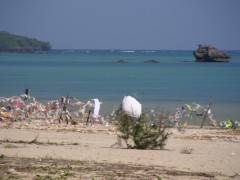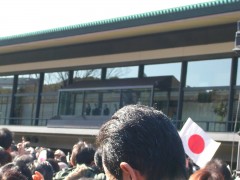09 January 2010
An Alliance Larger Than One Issue
Read this New York Times Article written by Joseph Nye, an prominent expert of US-Japan relationship.
An Alliance Larger Than One Issue
SEEN from Tokyo, America’s relationship with Japan faces a crisis. The immediate problem is deadlock over a plan to move an American military base on the island of Okinawa. It sounds simple, but this is an issue with a long back story that could create a serious rift with one of our most crucial allies.
--Ommited paragraphs from the original article.--
Even if Mr. Hatoyama eventually gives in on the base plan, we need a more patient and strategic approach to Japan. We are allowing a second-order issue to threaten our long-term strategy for East Asia. Futenma, it is worth noting, is not the only matter that the new government has raised. It also speaks of wanting a more equal alliance and better relations with China, and of creating an East Asian community — though it is far from clear what any of this means.
When I helped to develop the Pentagon’s East Asian Strategy Report in 1995, we started with the reality that there were three major powers in the region — the United States, Japan and China — and that maintaining our alliance with Japan would shape the environment into which China was emerging. We wanted to integrate China into the international system by, say, inviting it to join the World Trade Organization, but we needed to hedge against the danger that a future and stronger China might turn aggressive.
After a year and a half of extensive negotiations, the United States and Japan agreed that our alliance, rather than representing a cold war relic, was the basis for stability and prosperity in the region. President Bill Clinton and Prime Minister Ryutaro Hashimoto affirmed that in their 1996 Tokyo declaration. This strategy of “integrate, but hedge” continued to guide American foreign policy through the years of the Bush administration.
This year is the 50th anniversary of the United States-Japan security treaty. The two countries will miss a major opportunity if they let the base controversy lead to bitter feelings or the further reduction of American forces in Japan. The best guarantee of security in a region where China remains a long-term challenge and a nuclear North Korea poses a clear threat remains the presence of American troops, which Japan helps to maintain with generous host nation support.
Sometimes Japanese officials quietly welcome “gaiatsu,” or foreign pressure, to help resolve their own bureaucratic deadlocks. But that is not the case here: if the United States undercuts the new Japanese government and creates resentment among the Japanese public, then a victory on Futenma could prove Pyrrhic.
The photo of planned relocation site for Futenma, the construction plan threatens lives of endangered marine mammals, dugongs and a lot of other wildlives.

14:40 Posted in Japan News, Politics, US-Japan relationship | Permalink | Comments (0) | Tags: military, okinawa
04 January 2010
Saw Our Majesty
On 2nd of January, 2010, I went to the imperial palace to see annual new year greeting by the Emperor Akihito and his family members.
That was the day usually closed area of the palace becomes open to public. People with Rising Sun flags entered the palace and saw the emperor on the palace balcony covered by glass from the ground. He said "I am glad to have new year with all of you."

I am usually asked what the emperor means to us. Well, the answer is nothing. We are told that the emperor is symbol of the State.
But generally, he is far away from us. We know he does exist but we are not interested in him and his family.
I do think I have to appreciate his existence because the emperor functions great deal of our society.
Some claims the imperial system suceeded by bloodline should be abolished but I disagree. The system benefits our nation.
Under the emperor, we are all unified as Japanese. That's a good thing.
The emperor works as great diplomatic tool when it comes to dealing with big nations like China and the U.S.
Last month the emperor met with China's No.2 politician regardless earlier appointment than usual.
That gave a signal to the U.S. that Japan is placing more importance on China than ever.
The U.S. and Japan have a quarrel recently. China has now become a big card for us.
Anyway, I am glad we have such a great imperial system. Imperial system is a tradition of over 1000 years.
A Happy New Year with the Emperor!
16:48 Posted in Culture, Japan News, Politics, Tokyo Life | Permalink | Comments (0) | Tags: emperor
24 December 2009
Isn't he stupid?
I wouldn't do the same thing although I know importance of taking action like "Civil Disobedience."
He is like German Red Army and Japanese Red Army who were active in 1970's.
Interview with him reminds me of German film "Baader-Meinhof."
Their activity started with arson in department store and ended up with hi-jacking, killing innocent people and finally killing themselves in prison.
I don't like extremists, not real saver but egoist. They just enjoy their own party.
Really Stupid!
Novel "Kokoro" by Natsume Soseki
The story was written by Japan's infamous novelist, Natsume Soseki. The novel was released in early 20th century. The novel starts with the sentence "I always called him "Sensei (Sir)." It is a memoir of a man who met a cool older guy on the beach. When the two guys first met, they both wore swim suits like this.

14:49 Posted in Books, Culture | Permalink | Comments (0) | Tags: gay, literature





